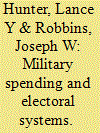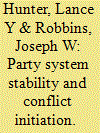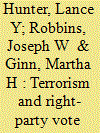| Srl | Item |
| 1 |
ID:
143280


|
|
|
|
|
| Summary/Abstract |
The implications for funding a military, though important, are still not fully understood. Existing work often surmises that military spending is higher in majoritarian electoral systems that are predicated on personalistic ties. However, further examination casts doubt upon these findings. Accordingly, we present a pooled time-series cross-sectional analysis of military spending and electoral institutions and we find that party-based electoral systems, rather than majoritarian ones, foment higher military spending levels—which we attribute to these systems’ predilection for public goods spending. These results are robust even when a host of control measures and four different military spending metrics are employed.
|
|
|
|
|
|
|
|
|
|
|
|
|
|
|
|
| 2 |
ID:
153881


|
|
|
|
|
| Summary/Abstract |
The study of interstate conflict has yielded a voluminous literature to date, yet much of the recent work has only just begun to underscore the importance of domestic factors in predicting conflict initiation in democracies. In short, some of these studies find that when electoral accountability is greater—measured in a variety of ways—interstate conflict becomes less likely. Despite this burgeoning literature, scholars have spent far less time analysing the role linkage institutions, such as stable party systems, have played in foreign policy discussions. To address this gap, we argue that in more stable party systems conflict initiation becomes less likely due to the greater accountability present in these systems. This conjecture is supported by the results of a time-series cross-sectional analysis of 48 democracies from 1978 to 2000 that uses multiple measures of conflict initiation and party system stability.
|
|
|
|
|
|
|
|
|
|
|
|
|
|
|
|
| 3 |
ID:
182532


|
|
|
|
|
| Summary/Abstract |
This study examines the electoral consequences for ideologically right-leaning political parties in the wake of terrorist attacks by employing an original dataset that captures political party vote shares and multiple terrorist indicators. Our analysis extends the partisan voting hypothesis to 56 democracies from multiple regions and levels of development between 1975–2014. Specifically, we find that the origins of terrorist perpetrators, the severity of terrorist attacks, and the frequency of terrorist incidents decrease right-party vote shares in legislative contests when incorporating standard controls. All told, these findings reinforce political psychological reasoning that contends terrorist attacks impact citizens’ emotions and voting calculations.
|
|
|
|
|
|
|
|
|
|
|
|
|
|
|
|